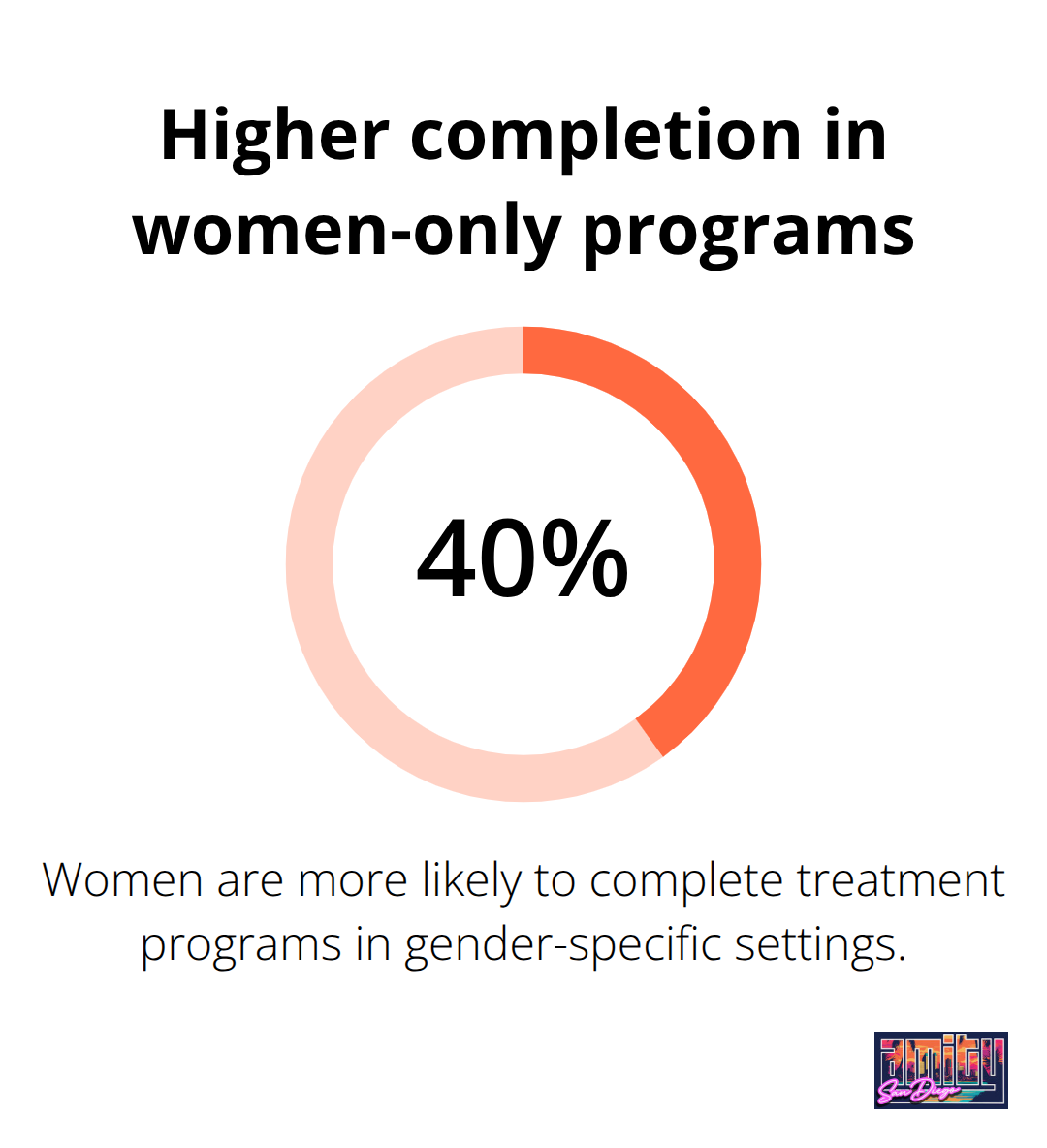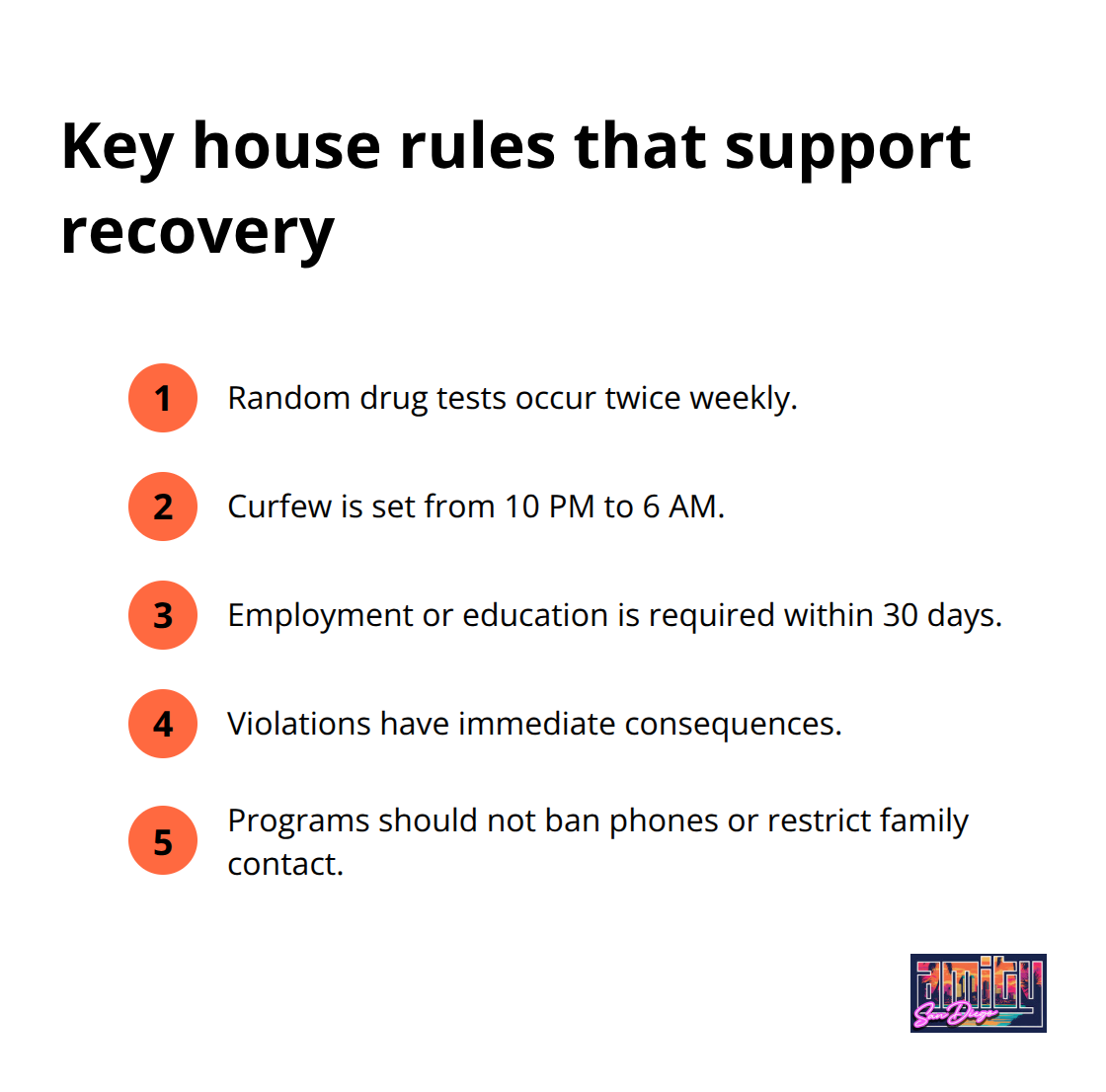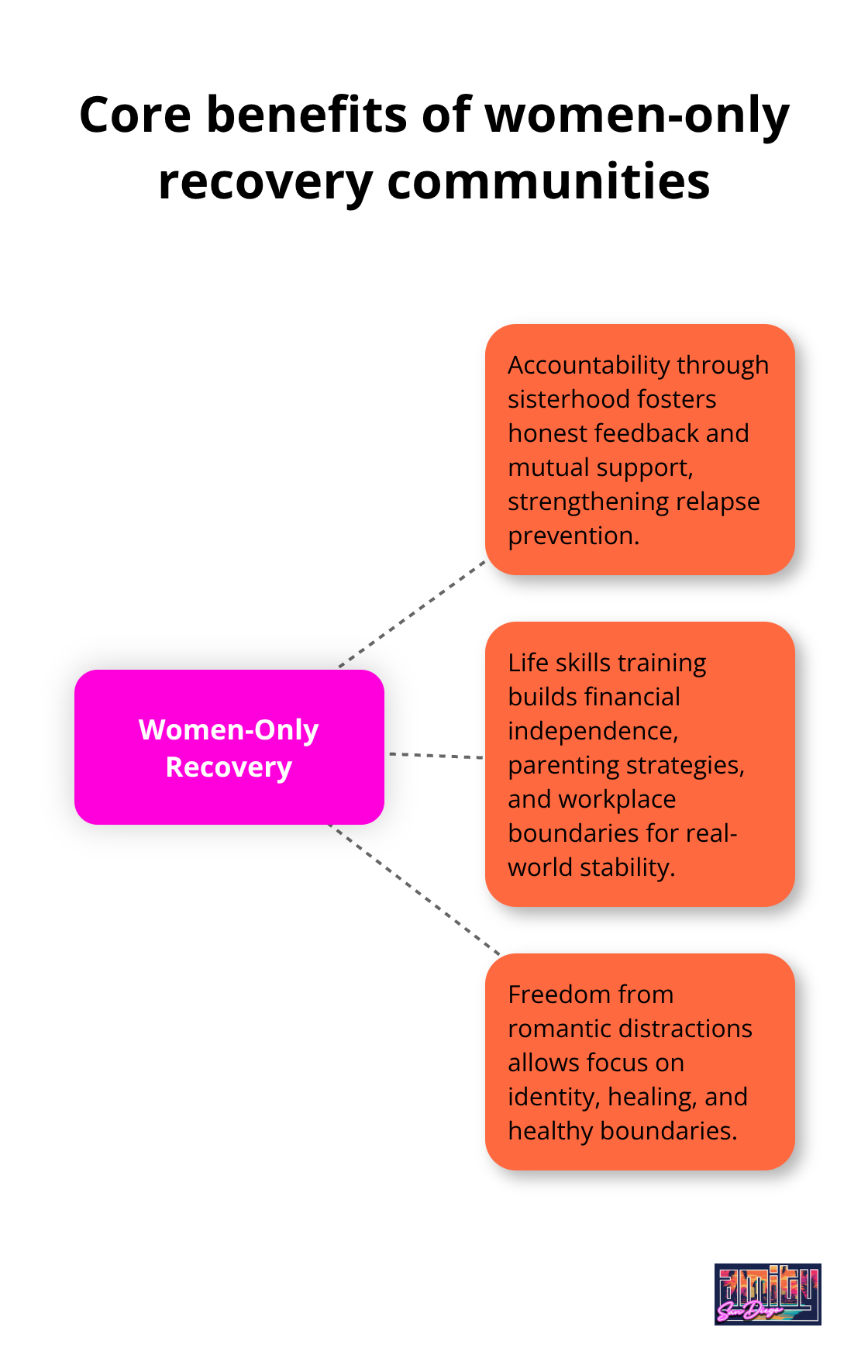Women face unique challenges during addiction recovery that require specialized support and understanding. Traditional mixed-gender facilities often fall short of addressing these specific needs.
At Amity San Diego, we recognize that sober living for females creates an environment where women can heal without judgment while building lasting recovery skills. Research shows women are 40% more likely to complete treatment programs in gender-specific settings.

Why Women Need Specialized Sober Living Environments
Women develop substance dependencies faster than men due to biological differences in metabolism and brain chemistry, according to the National Institute on Drug Abuse. This telescoping effect means women reach crisis points sooner and face more severe withdrawal symptoms. Hormonal fluctuations during menstrual cycles, pregnancy, and menopause intensify cravings and complicate recovery timelines.
Safety Creates the Foundation for Healing
Female-specific sober living eliminates romantic distractions and sexual tension that derail recovery progress in mixed-gender settings. Women report they feel safer when they discuss sensitive topics like sexual trauma, domestic violence, and body image issues without men present. The Substance Abuse and Mental Health Services Administration recognizes that women in addiction treatment face significant trauma-related challenges. This trauma history requires specialized therapeutic approaches that mixed-gender facilities cannot adequately provide.
Mental Health Demands Different Treatment Strategies
Women use substances primarily to self-medicate depression, anxiety, and PTSD symptoms, while men typically use substances for social or recreational purposes. Dual diagnosis treatment becomes essential since research indicates that 65% of women have co-occurring mental health conditions. Female-focused programs integrate trauma-informed care with addiction treatment and address root causes rather than just symptoms. Cognitive Behavioral Therapy and Dialectical Behavior Therapy work more effectively in women-only settings where participants share similar experiences with emotional regulation and interpersonal relationships.
Gender-Specific Programming Addresses Unique Needs
Women face distinct challenges that require specialized support systems in recovery environments. Childcare responsibilities, financial dependence, and societal expectations create additional barriers that men rarely encounter. Professional staff in women-only facilities understand these complexities and structure programs accordingly. For comprehensive addiction treatment San Diego resources, specialized programs address these gender-specific recovery needs.
What to Look for in Female-Focused Sober Living Homes
Three non-negotiable elements determine recovery success when you select the right women-only sober living facility. Licensed clinical staff must hold active California credentials and specialize in women’s addiction treatment, not general counseling backgrounds. Research shows that structured sober housing environments are associated with greater likelihood of satisfactory discharge and longer length of stays in outpatient treatment.
Professional Staff and Clinical Support
Staff credentials matter more than facility appearance when you evaluate programs. Look for Licensed Clinical Social Workers, Licensed Marriage and Family Therapists, and Addiction Counselors with specific training in trauma-informed care. The facility should offer individual therapy sessions weekly, not just group meetings. DBT and CBT programs must have certified practitioners who lead them, not volunteers who read from manuals. Ask about staff turnover rates during your visit – quality programs retain experienced clinicians for years, while substandard facilities cycle through new hires every few months.
House Rules and Structure
Effective house rules focus on sobriety maintenance and personal responsibility rather than petty restrictions. Mandatory drug tests should occur randomly twice weekly, with immediate consequences for violations. Curfews between 10 PM and 6 AM provide structure while they allow work and school flexibility. The best programs require residents to maintain employment or education within 30 days of admission.

Avoid facilities that ban cell phones or restrict family contact (these policies often indicate poor management rather than therapeutic necessity).
Location and Amenities
The physical environment directly impacts your recovery experience and daily motivation. Quality facilities maintain clean, modern accommodations with private or semi-private rooms that respect personal space. Kitchen access allows residents to prepare healthy meals and practice independent living skills. Transportation options matter significantly – facilities near public transit or that provide transportation services help residents maintain employment and attend appointments. Proximity to medical facilities, educational institutions, and recovery resources creates practical advantages that support long-term success.
These foundational elements create the framework for healing, but the real transformation happens through the relationships and community bonds that develop within women-only recovery environments. For comprehensive addiction treatment San Diego offers specialized programs designed to support lasting recovery.
Benefits of Women-Only Recovery Communities
Women-only recovery communities generate measurably better outcomes because they eliminate competitive dynamics and romantic complications that sabotage progress in mixed-gender settings. Research suggests that gender-specific treatment may benefit certain women who only seek treatment in women-only environments. Trust develops faster when women share experiences about body image, sexual trauma, and maternal guilt without male presence that creates judgment or distraction.
Accountability Through Sisterhood Drives Success
Female residents create accountability partnerships that extend beyond program completion. Recovery-supportive interventions are a cornerstone of the emergent recovery paradigm for people with substance use disorders. Women challenge each other directly about destructive behaviors while they provide emotional support during difficult moments. This peer accountability system works because women communicate differently than men – they address problems through discussion rather than confrontation.
Group therapy sessions become more productive when participants share similar experiences with domestic violence, eating disorders, and relationship codependency. Women celebrate recovery milestones together, which creates positive reinforcement that motivates continued sobriety. These bonds often last for years after program completion.
Life Skills Development Addresses Real-World Challenges
Women’s programs focus on practical skills that mixed-gender facilities overlook: financial independence, parenting strategies, and workplace boundary establishment. Residents learn budgeting techniques, job interview skills, and childcare coordination – abilities that prevent relapse when they face real-world pressures. Educational workshops cover reproductive health, legal rights, and domestic violence resources that women need but rarely receive in traditional treatment.
These programs prepare residents for independence rather than dependence on others for basic life management. Women practice these skills in a supportive environment before they transition to independent living (which reduces anxiety about post-treatment challenges).

Freedom From Romantic Drama Accelerates Healing
Women-only communities eliminate romantic relationships from recovery environments, which allows women to focus entirely on personal growth without emotional complications. Gender impacts substance use initiation, substance use disorder development, engagement with treatment, and harms related to drug and alcohol use. This distraction-free environment helps women rebuild self-worth and identity separate from romantic validation.
Women recognize unhealthy relationship patterns that contributed to their addiction and develop healthier boundaries for future relationships. They learn to value themselves independently rather than through others’ approval (a pattern that often fuels addictive behaviors). This foundation becomes essential for long-term recovery success.
For those seeking comprehensive addiction treatment San Diego offers specialized programs designed to support women’s unique recovery needs.
Final Thoughts
Female-specific sober living programs deliver superior recovery outcomes through targeted support that addresses women’s unique biological, psychological, and social challenges. The evidence overwhelmingly supports gender-specific treatment approaches that eliminate romantic distractions while they foster authentic peer connections and accountability partnerships. Women who choose sober living for females gain access to trauma-informed care, specialized mental health support, and life skills training that mixed-gender facilities cannot provide.
The safety and sisterhood found in these environments create lasting foundations for sustained recovery success. Your recovery journey deserves the specialized attention that recognizes your individual needs and challenges. Professional treatment programs combine evidence-based therapies with compassionate care to address both addiction and co-occurring mental health conditions (which often complicate the recovery process).
We at Amity San Diego offer comprehensive outpatient programs designed specifically for women who seek personalized, dignified treatment in a supportive environment. Quality addiction treatment San Diego programs provide the clinical expertise, peer support, and structured environment necessary for lasting transformation and healing. You don’t have to face recovery alone when professional support systems stand ready to guide your journey forward.



